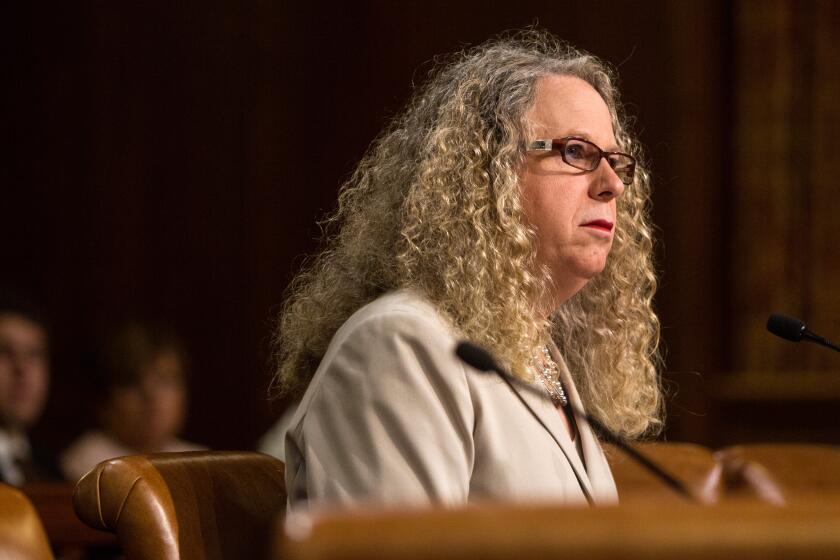Texas and Idaho show that red state attacks on transgender residents are getting more unhinged

- Share via
You have to hand it to Idaho lawmakers. In a season in which red-state politicians are battling each other in the competition for who can produce the most extreme anti-transgender policies, Boise legislators are poised to take home the trophy.
The Idaho House on Tuesday passed a measure that criminalizes gender-affirming therapies for children under 18, ranging from hormone and puberty-delaying treatments to surgery.
These treatments would be felonies subject to penalties of up to life in prison. Idaho’s real breakthrough, however, is that the crimes would also include arranging for such treatment out of state.
There are no four-year-olds going through irreversible medical procedures.
— Melissa K. Holt, Boston University
In other words, you can be persecuted in the state, and persecuted for leaving the state.
“Move-away” laws aren’t entirely unknown, but they typically apply to custody orders or agreements that limit the ability of a parent to move a child to a different state or abroad.
Get the latest from Michael Hiltzik
Commentary on economics and more from a Pulitzer Prize winner.
You may occasionally receive promotional content from the Los Angeles Times.
Strictures such as the Idaho proposal look to be flagrantly unconstitutional; it amounts to a state trying to regulate the laws of other states.
“The Supreme Court has said in numerous cases that freedom of travel is a fundamental right,” Berkeley law school dean Erwin Chemerinsky, a constitutional scholar, told me. He warns that some states may take a similar approach by prohibiting women from traveling out of state to get an abortion — indeed, just such a proposal has surfaced in the Missouri legislature.
Idaho House Bill 675 is now in the hands of the Idaho Senate. The measure takes its place with more than 300 anti-LGBTQ+ bills under consideration by state legislators across the country, according to a reckoning by the Human Rights Campaign, a watchdog for LGBTQ+ rights.
It appears that no such law allowing states or citizens to reach across boundaries to enforce a state law without an extradition procedure has been enacted in the U.S. since the Fugitive Slave Law of 1850, one of the most detested statutes ever passed by Congress.
This year is shaping up as even worse than the record-setting 2021, when legislators in a record 34 states introduced 147 anti-transgender bills. Discriminatory measures made it into law in 12 states last year.
An especially nasty development this week in transgender rights in Florida raises the question of whether transgender discrimination is the last frontier in sex discrimination, now that gay marriage is winning the fight for legal and social acceptance nationwide.
Texas, which is firmly in the control of regressive politicians, is among the leading states in anti-transgender policymaking. Last month, Republican Gov. Greg Abbott instructed state health officials to open investigations into families providing gender-affirming care for their transgender children on the grounds that the care could be defined as “child abuse.”
Abbott also said that professionals including doctors, nurses and teachers are bound by state law to report any such cases they’re aware of.
Authorities opened at least five such cases following Abbott’s directive, though one was temporarily blocked by a state judge who will hold a hearing Friday on whether to make her order permanent and extend it statewide. An appeal by Atty. Gen. Ken Paxton, whose legal opinion was the basis for Abbott’s order, was rejected Wednesday by a state appeals court.
Texas last year became the ninth state to enact a law barring students from playing on sports teams that don’t reflect their assigned sex at birth — perhaps the most popular legislative assault on transgender rights.
What accounts for the surge in anti-transgender legislation? One important factor is shrinkage in the ability of conservative culture warriors to find socially acceptable targets for hate-mongering and discrimination.
As I observed in 2018, open racism was out (though it made a strong comeback in the Trump era and on Fox News programs such as Tucker Carlson’s). In an increasingly pluralistic society, legislators who denigrated ethnic or religious minorities or those with mental illnesses or disabilities found themselves on the outs.
As laws allowing anti-transgender bias spread, a California response comes under attack.
Gay and lesbian Americans have moved into the mainstream of culture and society. Even conservatives have found themselves embracing gay and lesbian siblings, children and parents as worthy of familial love and respect.
Same-sex marriage is part of the cultural and entertainment mainstream, portrayed on popular TV programs without blinking.
Most important, gay and lesbian people have acquired a voice in the highest echelons of political power; gay-bashing no longer works for a political candidate as it has in the past, except perhaps in the most benighted corners of American society.
That leaves gender transition, which remains a process easily caricatured and demonized by unscrupulous politicians aiming to rally their base against a wholly imaginary crisis.
Consider the descriptions of gender dysphoria treatments in the Idaho measure and Abbott order. Both wring their hands figuratively over surgical interventions on children.
The Idaho proposal amends a law forbidding genital mutilation of female children to encompass any surgical change to the reproductive organs and parts of any child “for the purpose of attempting to change or affirm the child’s perception of the child’s sex.”
Abbott’s order, which claims to be aimed at “protecting children from abuse,” forbids mastectomies [and] removals of otherwise healthy body parts.” Both also forbid administering puberty-blocking medications or estrogen or testosterone to children.
Lynn Conway’s brilliant contributions to computer science didn’t stop IBM from firing her during her gender transition. Now it has apologized.
The truth is that “prior to the onset of puberty, kids typically receive non-medical care,” explained Boston University psychologist Melissa K. Holt during a recent roundtable discussion of the Texas order. Indeed, the medical standard of care discourages gender reassignment surgery before the age of 18.
Care for prepubescent children, Holt said, “is focused around social transitioning,” such as choosing a new name and adopting different dress, “and providing mental health and structural support, like schools using a child’s preferred gender pronouns and allowing them to use the bathroom that aligns with their gender identity.... There are no 4-year-olds going through irreversible medical procedures.”
As children move into adolescence, they can consider puberty blockers and hormone treatments, with the counseling of medical advisors.
What’s overlooked in the rush to criminalize gender-affirming treatments that have become accepted in the medical and counseling communities is the vulnerability of children trying to make their way through the gender labyrinth.
“Transgender and nonbinary youths are disproportionately burdened by poor mental health outcomes owing to decreased social support and increased stigma and discrimination,” researchers at the University of Washington and UC San Diego medical school reported in February. The consequences include depression, anxiety and suicide attempts.
Gender-affirming treatment and counseling can moderate these effects, the researchers found. Other researchers have termed the rise in anti-transgender legislation a “public health concern.”
As for efforts to block people from crossing state lines, that evokes some of the darkest days of American history. The Fugitive Slave Law was enacted as part of the compromise of 1850, under which California was admitted to the union as a free state and other territories acquired as spoils from the Mexican War could choose whether to become slave states or free.
The law allowed slave owners to demand the return of escaped or even freed slaves no matter where in the U.S. they were found. Citizens were required to assist in the capture of a putatively escaped slave, and anyone hiding or interfering with the capture of a former slave could be fined and jailed.
The law continued to be enforced through most of the Civil War, though the Emancipation Proclamation barred their return to states in the rebellious South. It wasn’t repealed until 1864.
Laws and court cases protecting slave owners’ rights aren’t typically regarded as models of American jurisprudence.
Anti-transgender laws and policies similarly place their sponsors on the wrong side of history. In their quest for temporary political advantage, maybe that doesn’t matter to them. But it should matter to the rest of us.
More to Read
Get the latest from Michael Hiltzik
Commentary on economics and more from a Pulitzer Prize winner.
You may occasionally receive promotional content from the Los Angeles Times.













